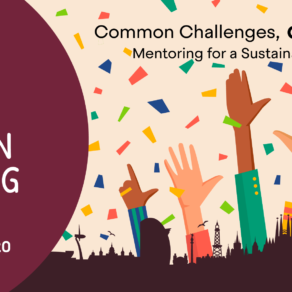Are you attending the 2020 European Mentoring Summit? Make sure you check your email and begin the registration to the sessions! Check out the agenda, plan your itinerary, edit your profile and you’re ready to enjoy the experience!
What do you need to know?
1. We have sent an email with your username (email) and password.
2. You can access the new website from this link: http://onlinementoringsummit.eu/
3. Attention! You will have to choose a team! We ask you to think about which of these words resonates more with you (more detail in the website!)
Achiever
Philanthropist
Disruptor
Socialiser
4. Choose your Sessions! Make sure you know how this works:
There are different types of sessions:
Ceremonies, Keynotes, Group Discussions, Workshops, Research Debate Tables, Roundtables and two special events: the Researchers Assembly and the Philanthropic Track. Most of them are open to all of you and will be spaces of encounter for the whole community. Others, however, have some limitations, as they would in an in-person event!
- Workshops: There will be a total of 25 spots per workshop. This means that you will get to choose up to 3 workshops marked with a turquoise tag throughout the week. We recommend you to check out the overall schedule and see which of the sessions you are more interested in before starting the selection.
- Group Discussions: These sessions are meant for you to actively participate in a topic that concerns mentoring in the current global context. You can only choose 1 session with this tag. They will take place on Monday the 5th and Wednesday the 7th from 11:00h to 12:15h CEST.
All the other types of sessions are completely open, so you can choose to attend as many of those as you want!
5. Stay Connected!
During the whole week, there will be different communication channels. We will be sending daily newsletters with a summary of the day, we will be using social media to make announcements, and we will be available in the new Summit website to assist you if you experience any technical issues or if you just want to connect. You will be able to contact the rest of the attendees directly from the website.
What can you do to stay well connected?
Follow us on Twitter: @MentoringSummit
Follow us on Instagram: @mentoringsummit.eu
Follow us on Facebook: @mentoringsummit.eu
We have also set a LinkedIn group for you to network with all the attendees! Find the exclusive link in the newsletter. This group will also be a communication channel where we will share relevant information through the event.




